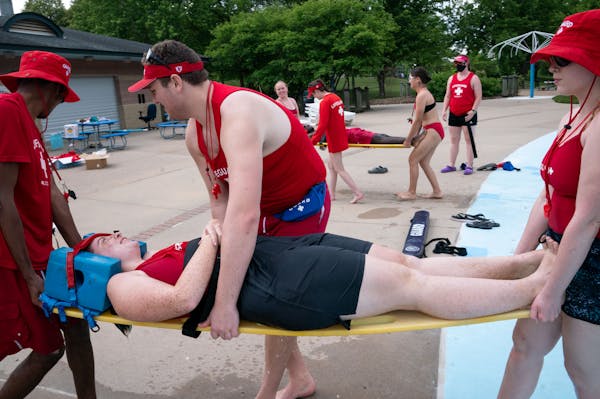It wouldn't be a Minnesota summer without a day at the beach or a nearby pool.
Across the country, aquatic centers and beaches have been experiencing a lifeguard shortage the past couple of years. Low pay and decreasing interest have played a part, but pandemic-era closures and restrictions have made it worse.
More than half of the 309,000 U.S. public pools reduced their hours or are closed this summer, according to the American Lifeguard Association.
Several Minnesota cities have raised wages as high as $19 an hour to avoid that problem. Hennepin County set aside just under $1 million for lifeguard grants to give to local governments. Bloomington offered signing bonuses for new hires.
"We needed to make it easy for people to become lifeguards," said David Benson, Bloomington's recreation supervisor. The city has also boosted salaries by $4.50 an hour, covered the costs of certification and training and even will pay a referral bonus for those who recommend a candidate.
While Bloomington Family Aquatic Center is fully staffed at 50 lifeguards, Benson said they had never worked harder to recruit for the season.
Better results in Ramsey County
Ramsey County was short on lifeguards in 2021 and 2022. The county could only put lifeguards at its waterpark Battle Creek Waterworks, but Lake McCarron Beach went unstaffed, said Kris Lencowski, the county's director of park operations..
This year, Ramsey County boosted its pay and was able to provide lifeguards at both.
In 2022, Lencowski said the county started paying for lifeguard certification training. Before, they would have to pay up to $200 to get certified.
But the incentive still wasn't enough to attract enough lifeguards last summer. So, halfway through recruitment this year, the hourly salary was raised $4 to $19 an hour.
The goal is to find the incentives that attract high school and college-aged teens, a popular demographic for the position. The wage increase was the key, he said.
Months of recruiting for Minneapolis
The search for summer lifeguards in Minneapolis began in the winter.
It takes 105 lifeguards to staff the Minneapolis Park and Recreation Board's Webber Natural Swimming Pool, North Commons and Lupient water parks, and three beaches. The agency needs to start early to find the right candidates.
Park Board staff recruited at over 100 colleges, high schools and youth organizations during the winter and spring months, said Robin Smothers, a spokeswoman for the Park Board.
The agency also boosted its incentives for lifeguards.
It offered American Red Cross certification reimbursement, a wage bonus for August and post-season operations, and salaries for up to $21 per hour depending on qualifications, Smothers said.
Nearly $1 million in grants
Hennepin County gave out 11 grants that ranged between $37,500 to $129,159 to help put lifeguards at pools and beaches throughout the county. The grants will be paid out over the next three years and can be used to pay higher wages, to cover recruitment costs and to buy new equipment, said Anna Carpenter, Hennepin County's youth sports and arts grant coordinator.
"We've learned that it's a really necessary resource for communities in order to hire lifeguards," Carpenter said.
County leaders had been hearing from parks staff across the county about troubles they were experiencing due to record lifeguard shortages. The county's grant initiative was created to help local governments address the problems.
The Minneapolis Park Board received $111,375 through the grant process, said Sarah Chillo, the agency's aquatics manager. The money will go toward training, recruitment, hiring, and incentives for employees to return.
"To be awarded this grant is a huge responsibility, and we are working really hard at the implementation of these funds," Chillo said.
A job like no other
There's more to being a lifeguard than being paid to sit at the pool. It's like a community to be there to help in times of crisis.
Rochester Swim Club, which pays $12 to $14 per hour to 60 lifeguards, hasn't needed to pay the big salaries to fill its positions across its two aquatic centers. It has fostered a community atmosphere that brings people back, said Autumn Kappes, CEO of the swim club.
Most lifeguards will return until they graduate from college and find a job.
"It's kind of like a family unit," Kappes said. "The kids really enjoy it, and it's like their own little community."
The friendly atmosphere and a chance to work outside in the sun is what drew Maddie Gaulrapp to apply to become a lifeguard last summer. Working a recent sunny Wednesday afternoon at Bde Maka Ska Thomas Beach, she said she earns $17.75 per hour and works 25 to 30 hours per week.
"I just really like people I work with, and it's a pretty fun job to be outside," Gaulrapp said.

Want to share info with the Star Tribune? How to do it securely

'Safe recovery sites' would offer syringes, naloxone and more to people using drugs. The plan could be in peril.
New Minnesota GOP leaders seek peace with party's anti-establishment wing

Who is Republican Lisa Demuth, Minnesota's first House speaker of color?

